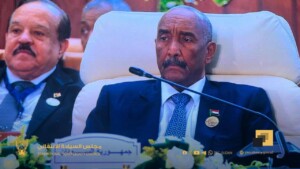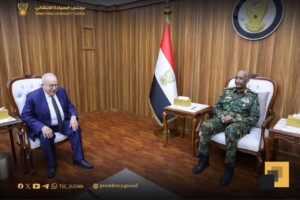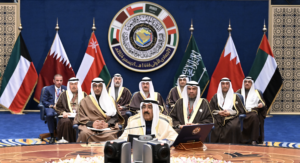Darfur rebel leader Minni Minawi lauds equal footing with Sudan military
Minni Minawi, head of the breakaway Sudan Liberation Movement (SLM-MM), spoke of the importance of rebel combatants being put on an equal footing with military forces in Sudan yesterday.
 Minni Minawi (right) and members of the rebel faction SLM-MM are greeted by members of the Sudan Liberation Movement and the Sudan Revolutionary Front upon their arrival in Juba on November 13, 2020 (Social media)
Minni Minawi (right) and members of the rebel faction SLM-MM are greeted by members of the Sudan Liberation Movement and the Sudan Revolutionary Front upon their arrival in Juba on November 13, 2020 (Social media)
Minni Minawi, head of the breakaway Sudan Liberation Movement (SLM-MM), spoke of the importance of rebel combatants being put on an equal footing with military forces in Sudan yesterday. The Rapid Support Forces (RSF) will “continue to defend the revolution”.
During his speech for the commemoration of “the martyrs of the movement” in the Friendship Hall in Khartoum, he explained that one of the most important results of the Juba Peace Agreement, signed in the South Sudanese capital on October 3, is that the rebel combatants killed during their armed struggle against the government of ousted President Al Bashir, are now placed on an equal footing with military forces.
“The agreement provides equal care for the martyrs’ families,” said Minawi, stressing the need to work towards national stability through continuous dialogue and consensus.
Abdelrahim Hamdan*, Deputy Commander of the Rapid Support Forces (RSF), also addressed the ceremony. He pledged to protect the revolution from those he described as “bandits, outlaws, and traitors” and who “have been secretly meeting with its leaders of the ousted regime in prisons at night [..] to steal the revolution”.
According to Hamdan, the country is controlled by a limited group that has “replaced empowerment (tamkin)** with another empowerment.” He called for confronting the group, which he described as authoritarian.
“All Sudan’s states are witnessing systematic strife to make the implementation of the peace agreement a failure,” he said, and called on the rebel movements “to unite and protect the peace”.
The militia commander further stated that his men were protecting the Khartoum sit-in set up on April 6, 2019, so they could not have killed the protesters. He promised to reveal the details after the report of the investigation commission, headed by prominent lawyer and human rights defender Nabil Adib, is completed.
He added that the RSF have thwarted a number of coup attempts since the ousting of Al Bashir on April 11, 2019.
June 3 Massacre
On April 6, 2019, protestors staged a sit-in in Khartoum to pressure the then ruling dictator Omar Al Bashir to step down. Five days later, the dictator was deposed in a military coup. The protestors, however, continued occupying the space in front of the Defence Ministry, calling on the military to hand over power to a civilian government.
Two months later, on June 3, the people at the sit-in were attacked by government forces. The attacks cost the life of 127 demonstrators and bout 700 protesters and others present at the sit-in that day were injured. More than 100 people went missing.
According to medics, 83 per cent of the victims of the revolution were killed after the ousting of Al Bashir on April 11.
An investigation report of the Sudanese Archive and the Human Rights Center Investigation Lab UC Berkeley states that the RSF and other security forces are responsible for the violent dispersal of sit-ins across Khartoum.
Last year, Sudan’s Prime Minister Abdallah Hamdok called the June 3 massacre “a criminal act against the Sudanese people for which the perpetrators must be held accountable”.
* Abdelrahim Hamdan is the brother of Mohamed Hamdan, nicknamed Hemeti, who is the deputy president of Sudan’s Sovereign Council and RSF Commander-in-Chief. Abdelrahim Hamdan recently also became a member of the controversial Transitional Partners Council.
** Empowerment (tamkin) is the term with which the ousted government of Omar Al Bashir supported its affiliates in state affairs by granting them far-going privileges, including government functions and the setting-up of various companies. In the end of 2019, the Sudanese government established the Empowerment Elimination, Anti-Corruption, and Funds Recovery Committee, with the aim to purge Sudan of the remnants of the Al Bashir regime.
Radio Dabanga’s editorial independence means that we can continue to provide factual updates about political developments to Sudanese and international actors, educate people about how to avoid outbreaks of infectious diseases, and provide a window to the world for those in all corners of Sudan. Support Radio Dabanga for as little as €2.50, the equivalent of a cup of coffee.












 and then
and then